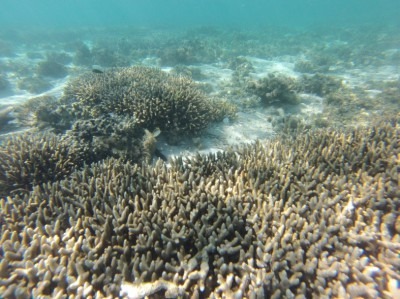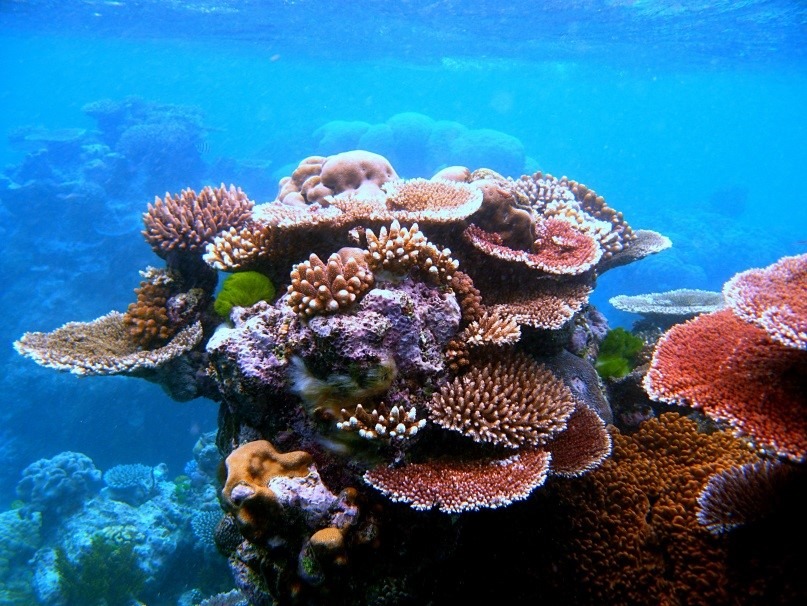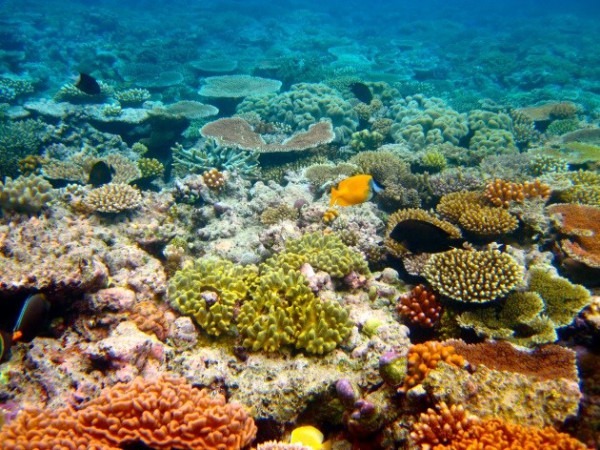The Australian Great Barrier Reef (GBR), truly one of the wonders of the world, is threatened by ongoing anthropogenic climate change. Because of increasing levels of CO2 and other ‘greenhouse gases’ in the atmosphere, air and water temperatures are tending upwards. The increasing CO2 in the atmosphere is also leading to higher levels of acidity in the ocean. Increases in water temperature and acidity are both bad news for the corals that form the GBR.
Bringing an end to anthropogenic climate change, and thus protecting the GBR, is a global issue as the atmosphere circulates around the planet. Burning of coal, and other fossil fuels, in China, India or USA, three major emitters of CO2, affects levels of CO2 in the atmosphere throughout the world. So too does burning fossil fuels in Australia, though to a much lesser extent, simply because Australia has a much lower population size than these other countries and consequently burns less coal and other fossil fuels. In fact, this difference between Australia and the rest of the ‘developed’ world arises despite the fact that Australians per capita contribute as much or more CO2 than anyone else.

Protecting the GBR, along with many other ecosystems and the wellbeing of humanity, therefore requires a world-wide wind-down of the burning of coal and other fossil fuels, and hence a broad-scale wind-down of the coal industry, along with industries based on other fossil fuels. The current problems faced by the GBR are symptomatic of the general problems associated with anthropogenic climate change. The solution to all such problems is the same… stop burning fossil fuel globally, use renewable energy sources instead. It’s that simple.
However, coal mining and its subsequent processing are activities that involve relatively local geographic scales, with jobs and income dependent on these activities. Economies at local and regional scales sometimes rely heavily on the coal industry.
It is therefore irresistible for Queensland, the Australian state within and adjacent to which the GBR occurs, to argue that:
- The coal industry is essential to the economy by virtue of consequent jobs and income;
- Queensland makes negligible contribution to anthropogenic climate change, especially relative to contributions made by the rest of the world;
- Therefore, coal mining and the rest of the coal industry in Queensland should be supported and encouraged
Herein lies a tragedy of scale, regardless of how valid the argument is. Obviously almost every jurisdiction could argue similarly. And if so, then there will be little to no reduction in burning of coal and other fossil fuels, anthropogenic climate change will continue, we shall lose most or all of the GBR, and we, our children and future generations will no doubt suffer.

https://en.wikipedia.org/wiki/File:Coral_Outcrop_Flynn_Reef.jpg
Resolving this tragedy is possible, I think, but it will not be easy. The only real chance, it seems to me, is if all of us, as individuals, make decisions and take actions that will encourage an end to anthropogenic climate change.
So, how might we do it?
Here are some possible ways in which we might all encourage the development of a world without ongoing anthropogenic climate change:
- Investment of money:
Invest in renewable energy rather than burning fossil fuels, either through personal investment or investment through one’s superannuation fund, bank, institution, and so on;
Support appropriate groups and agencies, including so-called Non-Government Organisations (NGOs).
- Investment of time:
Participate with appropriate groups and agencies.
- Vote for elected representatives who will take appropriate action:
Political candidates with platform of reducing or eliminating anthropogenic climate change.
- Take appropriate personal action:
Often relatively easy to do, but unlikely to achieve very positive results in absence of other strategies listed above.
In order to resolve the tragedy of scale, I am taking action on all of these fronts. I hope that you will too.
MAHB-UTS Blogs are a joint venture between the University of Technology Sydney and the Millennium Alliance for Humanity and the Biosphere. Questions should be directed to joan@mahbonline.org
The views and opinions expressed through the MAHB Website are those of the contributing authors and do not necessarily reflect an official position of the MAHB. The MAHB aims to share a range of perspectives and welcomes the discussions that they prompt.
